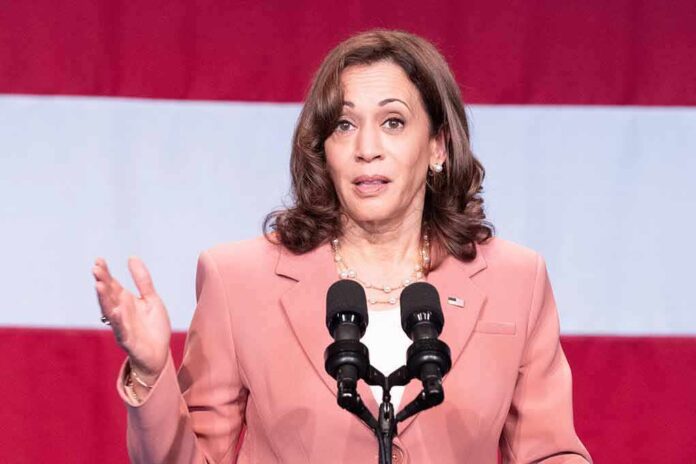Kamala Harris’s fracking flip-flop leaves Pennsylvania energy workers skeptical as she eyes the White House.
At a Glance
- Vice President Kamala Harris reversed her stance on banning fracking, raising doubts in Pennsylvania’s energy sector
- Pennsylvania Governor Josh Shapiro emerges as a potential running mate to bolster Harris’s appeal in the state
- Republicans criticize Harris’s policy shift, highlighting her previous support for the Green New Deal
- Harris faces challenges in winning over energy workers and union leaders in Pennsylvania
- The natural gas industry contributes significantly to Pennsylvania’s economy, supporting over 300,000 jobs
Harris’s Fracking Reversal Sparks Controversy
Vice President Kamala Harris’s recent reversal on fracking has ignited a firestorm of controversy in Pennsylvania’s energy sector. Once a vocal advocate for banning fracking during her 2020 presidential campaign, Harris now finds herself backpedaling on this stance as she potentially eyes a 2024 White House bid. This policy shift has left many in Pennsylvania’s crucial energy industry questioning her sincerity and long-term intentions.
The vice president’s changing position on fracking has not gone unnoticed by industry leaders and workers alike. Jeff Nobers, executive director of the Builders Guild of Western Pennsylvania, emphasized the need for Harris to engage directly with union leaders in energy-intensive areas. “She really needs to have face-to-face conversations with union leaders in the areas most affected by this and go on the record of being a supporter and proponent of natural gas — not just someone who won’t ban fracking,” Nobers stated in an interview.
Worried Pennsylvania energy workers don’t trust Kamala Harris’ fracking flip-flop https://t.co/Hj8BMUbsBH pic.twitter.com/fqSKiyfYCI
— New York Post (@nypost) September 13, 2024
Shapiro: A Potential Game-Changer?
As Harris grapples with skepticism from Pennsylvania’s energy sector, Governor Josh Shapiro emerges as a potential ace up her sleeve. Shapiro, known for his balanced approach to energy policy, has successfully navigated the complex interests of environmentalists, fossil fuel industries, and labor unions. His pragmatic stance and high approval ratings make him an attractive potential running mate for Harris.
“Simply to flip flop and say, ‘Oh, I didn’t mean that, my position is the opposite now,’ that just strikes me as being completely opportunistic and insincere,” David Taylor, head of the Pennsylvania Manufacturers’ Association, a Harrisburg-based industry group, said of Harris’ fracking reversal. – Source
Nobers went as far as to predict that Harris would “probably win” Pennsylvania if she chose Shapiro as her running mate, citing the governor’s strong ties to unions. Shapiro’s ability to balance environmental concerns with economic realities could prove crucial in swaying voters in this key battleground state.
Republican Pushback and Economic Stakes
Republicans are seizing on Harris’s policy shift, painting it as a cynical ploy to win votes. GOP nominee Dave McCormick and others are using Harris’s past positions to attack her credibility. They argue that her previous support for the Green New Deal and actions against fracking reveal her true intentions, despite her recent change of heart.
“Fracking is a central part, a foundational part, a significant portion of Pennsylvania’s economy. The economic argument is going to be extremely significant nationally, and in the States, it’s the top issue on voters’ minds,” said Jon Reinish, a national Democratic strategist. – Source
The stakes are high for Pennsylvania’s economy. The natural gas industry contributes a staggering $44.5 billion annually to the state’s economy and supports over 300,000 jobs. Many workers fear that a Harris administration could lead to increased regulations that would hinder the industry’s viability and economic contribution.
The Road Ahead for Harris
As the 2024 election looms, Harris faces an uphill battle in winning over Pennsylvania’s energy sector. Her path to victory likely involves courting suburban voters rather than regions central to the natural gas boom. However, she cannot afford to alienate energy workers and union members who form a significant voting bloc in the state.
“There’s already uncertainty with just what does she believe, what she would do.” — Jeff Nobers, executive director of the coalition of union and business leaders Pittsburgh Works Together. – Source
To succeed, Harris must convince Pennsylvania voters that her current stance on fracking is genuine and not merely a political calculation. She will need to balance environmental concerns with economic realities, a task that may prove challenging given her previous hardline stance against fracking. As the election draws nearer, all eyes will be on Harris to see if she can navigate these turbulent political waters and win over skeptical Pennsylvanians.











